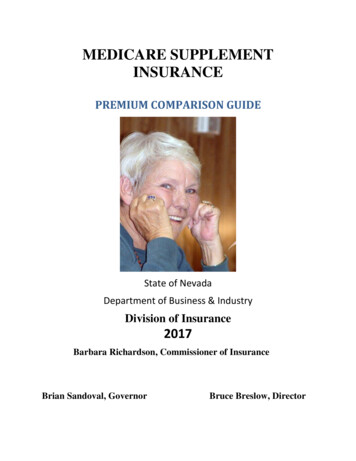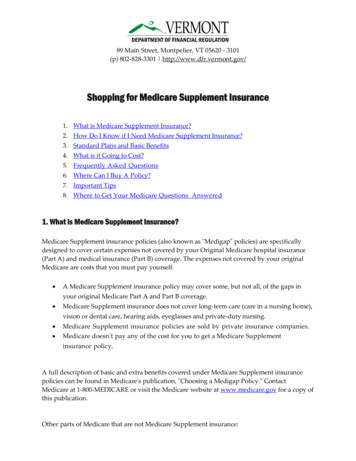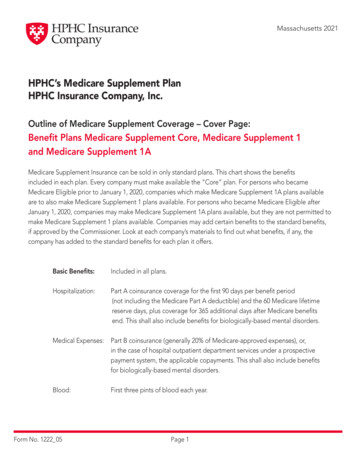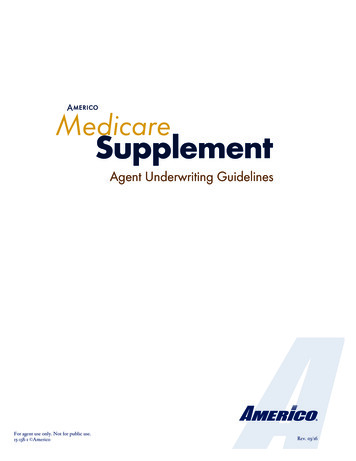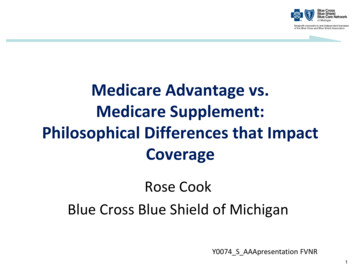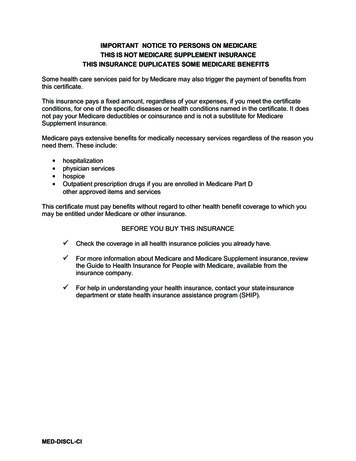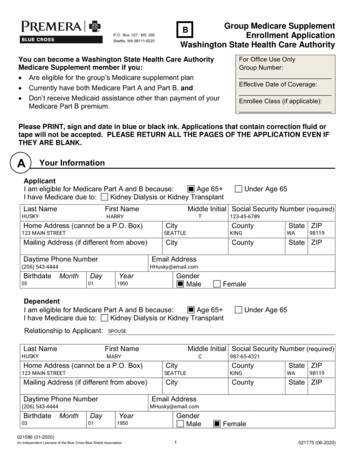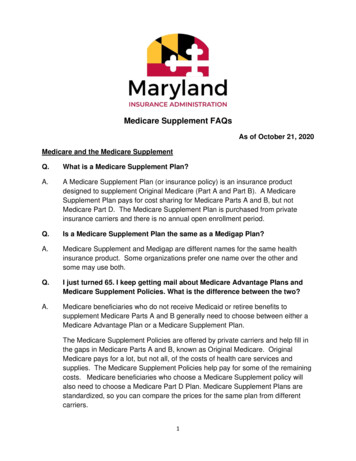
Transcription
Medicare Supplement FAQsAs of October 21, 2020Medicare and the Medicare SupplementQ.What is a Medicare Supplement Plan?A.A Medicare Supplement Plan (or insurance policy) is an insurance productdesigned to supplement Original Medicare (Part A and Part B). A MedicareSupplement Plan pays for cost sharing for Medicare Parts A and B, but notMedicare Part D. The Medicare Supplement Plan is purchased from privateinsurance carriers and there is no annual open enrollment period.Q.Is a Medicare Supplement Plan the same as a Medigap Plan?A.Medicare Supplement and Medigap are different names for the same healthinsurance product. Some organizations prefer one name over the other andsome may use both.Q.I just turned 65. I keep getting mail about Medicare Advantage Plans andMedicare Supplement Policies. What is the difference between the two?A.Medicare beneficiaries who do not receive Medicaid or retiree benefits tosupplement Medicare Parts A and B generally need to choose between either aMedicare Advantage Plan or a Medicare Supplement Plan.The Medicare Supplement Policies are offered by private carriers and help fill inthe gaps in Medicare Parts A and B, known as Original Medicare. OriginalMedicare pays for a lot, but not all, of the costs of health care services andsupplies. The Medicare Supplement Policies help pay for some of the remainingcosts. Medicare beneficiaries who choose a Medicare Supplement policy willalso need to choose a Medicare Part D Plan. Medicare Supplement Plans arestandardized, so you can compare the prices for the same plan from differentcarriers.1
Enrolling in a Medicare Advantage Plan, also known as “Part C,” is another wayto help fill the gaps. These plans, offered by private carriers, cover all MedicarePart A and Part B services and often also include coverage for prescription drugs(Part D). Medicare Advantage Plans may also offer extra coverage such asvision or dental. Each Medicare Advantage Plan can charge different premiumsand out-of-pocket costs. Generally, the beneficiary will continue to pay thepremium for Medicare Part B while enrolled in a Medicare Advantage Plan, aswell as any premium the carrier charges for the Medicare Advantage Plan.Medicare Advantage Plans include, for example, HMOs (health maintenanceorganization), PPOs (preferred provider organization), and fee for serviceproviders. Depending upon the plan you select, the Plan may pay only forservices provided by an in-network provider or offer reduced benefits for servicesprovided by an out-of-network provider, so you may want to check if yourproviders are in-network. Seeing a doctor who is out-of-network may only becovered for an emergency or be more expensive. When you compare theseplans, it is a good idea to consider the network and any different benefits theyoffer, as well as the monthly premium costs.Q.Is there a comprehensive document available to help me understandMedicare Supplement Policies?A.If our FAQs don’t answer your questions or if you want to read more in-depthabout the Medicare Supplement plans, you can read the Centers for Medicareand Medicaid Services (CMS) guide, “Choosing a Medigap Policy: A Guide toHealth Insurance for People with Medicare.” The document explains what thedifferent policies cover, your rights to buy a policy, and how to purchase aMedicare Supplement policy. You can find the most recent version re-medigap-guide.pdf.You can also visit CMS’ dedicated Medigap Plans Medigap/index.Maryland’s State Health Insurance Program (SHIP) is a free program to helpthose on Medicare with personalized Medicare counseling, education, andaccess to financial assistance resources. Each of the Maryland counties andBaltimore City have access to a SHIP and you can find your local office ents/publicnew/ship-phonenumbers.pdf.2
Medicare Supplement Plan BasicsQ.What’s the first step I should take when considering a MedicareSupplement policy?A.It may be difficult or impossible to switch Medicare Supplement policies later so itis a good idea to spend some time thinking about your current and futurehealthcare needs and which benefits are important to you. Know the differencebetween the plans and choose the one that fits best for you. A chart describingthe difference in benefits can be found in this edicare-medigap-guide.pdfIf you want to talk to a someone about your Medicare options, SHIP is a freeprogram to help those on Medicare with personalized Medicare counseling,education, and access to financial assistance resources. Each of the Marylandcounties and Baltimore City have access to a SHIP and you can find your localoffice here publicnew/shipphone-numbers.pdf.Q.How many Medicare Supplement Plans are available?A.Nine standard Medicare Supplement Plans are available in Maryland. TheMedicare Supplement Plans are standardized and identified by a letter. Plans A,B, C, D, F, G, K, L, M, and N are currently sold. All plans of the same letter offerthe same basic benefits, even if the plan is offered by a different carrier.Q.I’ve heard Medicare Plans C and F are no longer available. Is that true?A.By law, Plans C and F are available for purchase only to those eligible forMedicare before January 1, 2020.Q.Why are plans C and F no longer available to those newly eligible forMedicare?A.Starting on January 1, 2020, Medicare Supplement Plans that cover theMedicare Part B deductible are not allowed to be sold to those new to Medicare.Because of this, Plans C and F are not available to those newly eligible toMedicare as of January 1, 2020. If you were eligible for Medicare before January1 2020, but you had not yet enrolled, you are still eligible to purchase plans Cand F.Q.My mother has a discontinued plan. Can she keep it?A.Plans E, H, I and J are no longer sold, but if you already have one you cangenerally keep the policy.3
Q.Do insurance carriers have to offer all the plans?A.No, insurance carriers in Maryland don’t have to sell all of the different plans, butcurrently they all offer Plan A.Q.Are there differences between the same plan sold by two differentinsurance carriers?A.Only the policy costs will vary between carriers.Q.Are there high deductible options? What is the 2020 deductible for thehigh deductible plans?A.Plans F and G both include a high deductible option. The deductible for 2020 is 2,340.Q.Where can I get information about the insurance carriers currently sellingMedicare Supplement Plans in Maryland?A.The MIA publishes a rate guide which is available on our website e rate guide is updated each January and July. Individuals should contact theinsurance carrier to confirm the rates in effect when they are applying.Q.If I purchase a Medicare Supplement Plan do I need to still continue to paythe Medicare Part B premium?A.Yes, you pay the insurance carrier a premium for the Medicare Supplement Planin addition to the monthly premium for Medicare Part B.Q.Do the Medicare Supplement Plans cover prescription drugs?A.Some plans sold before 2006 include prescription drug coverage, but policiessold since January 1, 2006 are not allowed to include prescription drug coverage.Prescription drug coverage, Medicare Part D, is offered through private insurancecarriers approved by Medicare.Q.What is the Medicare Supplement Open Enrollment Period?A.This is the time period where you can enroll in a plan or switch to another plan.This period lasts for six months and begins on the first day of the month you areenrolled in Medicare Part B. During this period, an insurance carrier cannot usemedical underwriting (the process during which the insurance carriers use healthinformation collected from you to decide whether to accept your application orcharge you more). For individuals who are at least 65 years old, the insurer may4
not deny the policy, limit coverage, or increase rates based on the health statusor claims history of the applicant for the 6-month period following first enrollmentin Part B of Medicare.If a carrier offers Plans A and D to persons who are at least 65 years old, it mustoffer these plans to individuals who are under 65 and eligible for Medicare due toa disability during the first 6 months following the individual’s enrollment in Part Bof Medicare or if the applicant is notified by Medicare of retroactive enrollment inMedicare for the 6 months following notice. Plan A and D may not be denied orhave coverage reduced based on the health status or claims history of theapplicant.Q.Can I be medically underwritten when I apply for a Medicare Supplementpolicy?A.After the 6-month initial guaranteed issue period upon enrolling in Medicare PartB, individuals will usually be subject to medical underwriting for a new MedicareSupplement policy. However, there are exceptions for additional guaranteedissue policies, which we cover in the “Guaranteed Issue” section of this FAQ.Q.Does my Medicare Supplement policy have to cover my pre-existingconditions?A.Your policy may impose a “waiting period” for coverage related to certain preexisting conditions. In certain cases, the insurance carrier may refuse to coveryour out-of-pocket cost for pre-existing conditions for up to six months, called a“pre-existing waiting period.” This coverage can only be excluded if the conditionwas diagnosed or treated in the 6-month period before you enrolled in theMedicare Supplement Plan. However, it is possible to avoid or shorten yourwaiting period if you buy a policy during the Open Enrollment Period or if you arereplacing another health insurance plan that counts as creditable coverage. Talkto the administrators of your current plan to learn how your plan’s rules couldaffect you.Q.What if I have health problems? Can my Medicare Supplement Plan dropme?A.Your Medicare Supplement policy is considered guaranteed renewable. Thismeans your insurance carrier cannot cancel your policy unless you fail to payyour premiums on time or make a material misrepresentation.Q.My insurance producer (also known as an agent or broker) explained thatthe Medicare Supplement policies can be based on issue age, attained age,or community rating. I’m so confused! Can you explain each?5
A.“Issue Age” means that premiums are based on your age at the time youpurchase the policy. While premiums may periodically increase due to benefitchanges, inflation, or increases in medical costs, they will not increase due toyour advancing age.“Attained Age” means that premiums are based on your age on the last policyanniversary date. Premiums are scheduled to increase at predeterminedintervals (for example, every year or every 5 years). These increases are inaddition to premium increases because of benefit changes, inflation, orincreasing medical costs.“Community Rated” means that premiums do not depend on your age, either atthe time the policy is issued or upon renewal. Premiums depend on other factorsand may increase because of benefit changes or overall premium adjustments.Q.I was just looking through your Medicare Supplement rate guide and amwondering about those Medigap Plans that are religiously-affiliated andthose that have a membership requirement? Is this allowed?A.Most Medicare Supplement Plans are issued to individuals by insurance carriers.These will not have any religious component or requirement to join a group.An insurance carrier may sell a group Medicare Supplement Plan to a qualifyinggroup. AARP is the best known association in Maryland, but there may be othergroups that purchase a group Medicare Supplement Plan and offer to enrollmembers of the group.There are also companies that are not insurers that offer Medicare SupplementPlans, such as Fraternal Benefit Societies. Because they are fraternal benefitsocieties, members have a common bond, such as religion. As a result, thefraternal benefit societies can ask an applicant for information to see if you meettheir requirements for membership. The MIA lists all companies with approvedMedicare Supplement Plans and you can find them in the rate guide f.Q.Is vision and dental care available under a Medicare Supplement Plan?A.Generally, Medicare Supplement Plans do not cover vision or dental, hearingaids, or eyeglasses.Q.Are discounts available with the Medicare Supplement Plans?A.There may be discounts for a period of time. Also, while policies are issued toindividuals (and not, for example, a couple or a family), some carriers may offer adiscount for multiple policies purchased by individuals in the same household.6
Q.Is financial assistance available for the Medicare Supplement Plans?A.There are no programs available to help with the costs of the MedicareSupplement Plans. If you need to speak to someone about Medicare andfinancial assistance, please reach out to your local SHIP office.SHIP is a free program to help those on Medicare with personalized Medicarecounseling, education, and access to financial assistance resources. Each of theMaryland counties and Baltimore City have access to a SHIP and you can findyour local office ents/publicnew/ship-phonenumbers.pdf .Q.I’ve had my Medicare Supplement Plan A for years, but I’m thinking aboutswitching to a Plan L. Can I switch to a different plan?A.Generally, you cannot switch Medicare Supplement policies unless it is during anOpen Enrollment Period or you have a 63-day guaranteed issue right. If you areconsidering switching plans, keep in mind that you may be subject to medicalunderwriting and you can be denied. Remember that premiums and out-ofpockets costs may be different with a new Medicare Supplement Plan, so besure to understand that differences between plans if you are thinking aboutswitching plans.Q.Can I keep my current Medicare Supplement policy or switch to a differentMedicare Supplement policy if I move out of Maryland?A.In general, you can keep your current Medicare Supplement policy regardless ofwhere you live as long as you still have Original Medicare.Q.I currently have a Medicare Supplement policy, but I just recently qualifiedfor Medicaid. I'm not sure how long I'll qualify for Medicaid. Can I go backto my Medicare Supplement policy later?A.If you recently qualified for Medicaid and are currently enrolled in a MedicareSupplement policy, you can suspend it for up to 2 years after you transition ontoMedicaid so long as you notify the carrier within 90 days of enrolling in Medicaid.To reinstate your Medicare Supplement policy, you will need to notify the carrierwithin 90 days of the date you become ineligible and pay the premium from thatdate forward. If you take these steps, the Medicare Supplement policy will beautomatically reinstated.7
Maryland Insurance Administration (MIA) and Medicare Supplement PlansQ.Does the Maryland Insurance Administration regulate Medicare?A.The MIA regulates insurance policies issued in Maryland, including MedicareSupplement Plans. For Medicare Supplement Plans, the MIA reviews policyforms, approves premium rates, and investigates complaints from consumers.The MIA does not regulate Medicare Advantage or Part D Plans, except forsolvency and insurance producer conduct – making sure producers follow therules and laws. The MIA does not regulate Medicare Parts A or B.Q.Can the MIA help if I have questions about parts of Medicare besides theMedicare Supplement?A.The Maryland Insurance Administration cannot answer questions regardingMedicare Parts A and B and recommends that you contact your local SHIP or theCenters of Medicare and Medicaid Services (CMS) for assistance.CMS is a federal agency within the U.S. Department of Health and HumanServices. CMS administers the Medicare program and can answer yourquestions regarding the Medicare Program. The CMS website at www.cms.govcontains valuable information regarding Medicare, including a handbook onMedicare entitled, “Medicare & You” that provides detailed information onMedicare program benefits, rights and obligations. You may also contact CMSdirectly by calling toll free, 1-800-MEDICARE, or visiting the Medicare website atwww.medicare.gov.SHIP is a program the help those on Medicare with personalized Medicarecounseling, education, and access to financial assistance resources. Each of theMaryland counties and Baltimore City have access to a SHIP and you can findyour local office ents/publicnew/ship-phonenumbers.pdfQ.Can a carrier increase the premium for a Medicare Supplement Plan?A.Your premium for a Medicare Supplement Plan cannot be increased for one yearfrom the date your policy becomes effective. After the first year, the premiummay increase up to one time per year, but only if the MIA has approved thecarrier’s rate increase.The MIA makes its decision whether to approve or deny a rate increase based oninformation the carrier is required to submit annually, including the proposed ratechange and information about how the rates were calculated.8
Q.How does the Maryland Insurance Administration decide to approve/denyor adjust a rate increase request?A.The staff of the MIA’s Office of the Chief Actuary reviews the documents filed bythe insurance carrier to determine if the rates comply with the established lossratio standards, and are not unfairly discriminatory. Premium rates are alsocompared with benefits and current experience to determine if we willapprove/deny or adjust a proposed rate increased.Q.How often can Medicare Supplement rates be increased?A.Medicare Supplement rates can only change once per year for each insured.Q.Does “file and use” apply to Medicare Supplement policies?A.No, “file and use” does not apply to Medicare Supplement policies. Rates mustbe approved before they can be used.Q.How can I get information about past rate increases?A.Information about past rate increases is available to the public through theNAIC’s System for Electronic Rates and Forms Filing (SERFF). SERFF includesdata provided by the insurance carriers for the last five years of rate changehistory. To access this information, you may either visit the NAIC’s SERFFwebpage for Maryland, https://filingaccess.serff.com/sfa/home/MD, or submit aPublic Information Act request to the MIA via the MIA’s cRecordsCenter.aspxQ.Is there data available to the public regarding enrollment numbers inspecific Medicare Supplement Plan?A.Yes, this data may be available and can be requested through the MarylandPublic Information Act from the Maryland Insurance Administration. You cansubmit a Public Information Act request to the MIA via the MIA’s cRecordsCenter.aspxQ.Is there information available about complaints against insurance carriersoffering the Medicare Supplement product?A.This information may be available from the National Association of InsuranceCommissioners (NAIC). You can search for complaint statistics and details attheir Consumer Information Source by following this link:https://eapps.naic.org/cis/help.do. You can also submit a Public Information Actrequest to the MIA via the MIA’s cRecordsCenter.aspx.9
Guaranteed Issue RightsQ.What are “guaranteed issue rights”?A.“Guaranteed issue rights” refers to laws that guarantee (ensure) that you canpurchase a replacement Medicare Supplement plan outside of the regular OpenEnrollment Period if you lose your existing coverage because of a specifiedevents. If you have the right to “guaranteed issue”, an insurance carrier must sellyou a Medicare Supplement policy, cover all your pre-existing health conditions,and cannot charge you more for coverage based on your health status or history.To qualify for guaranteed issue rights, you must meet the requirements set out inthe regulation and your situation must fall within one of the enumerated events.Under Maryland law, events that may trigger your right to a guarantee issue caninclude, for example, the carrier has gone bankrupt or breached a material termof the contract, the insurance producer or carrier materially misrepresented theterms of the policy, or you terminated the Medicare Supplement policy andsubsequently enrolled in a Medicare Advantage Plan, among others.Q.Where can I find the relevant laws for the Medicare Guaranteed issuerights?A.Guaranteed issue for Medicare Supplement plans is governed by:1. Section 15-909 of the Insurance Article of the Annotated Code of Maryland;and2. COMAR 31.10.06.06 and 31.10.06.09-1.Q.Are there guaranteed issue rights for Medicare Supplement Plans outsideof the initial guaranteed issue period?A.Yes, there are several cases where you can receive a guaranteed issue rightoutside of initially qualifying for Medicare.The guaranteed issue period lasts 63 days. The date it begins depends on thereason for the guaranteed issue period. In many circumstances, it is the datecoverage terminates, but you should carefully review the regulation to determinethe date. An organization that is terminating coverage is required to give notice.There may be limits on the plans available. The regulation lists the plans thatmust be available in specific circumstances.10
The Medicare Supplement Policies are offered by private carriers and help fill in the gaps in Medicare Parts A and B, known as Original Medicare. Original Medicare pays for a lot, but not all, of the costs of health care services and supplies. The Medicare Supplement Policies help pay for some of the remaining costs.
